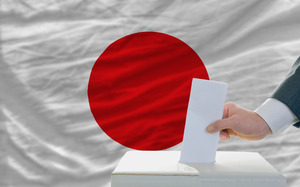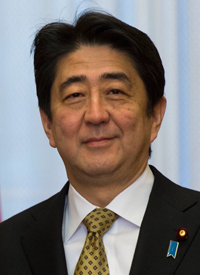 If you want him to smile broadly, don't call him Abe as in Abe Lincoln but address him as Abe as in 'Ahbee'. Despite the often mis-pronunciation of his last name, 60-year-old Japan Prime Minister Shinzo Abe and his Liberal Democratic Party rolled to an impressive 291 seat victory in the powerful 480-seat Lower House in the Dec. 13 Parliamentary snap elections.
If you want him to smile broadly, don't call him Abe as in Abe Lincoln but address him as Abe as in 'Ahbee'. Despite the often mis-pronunciation of his last name, 60-year-old Japan Prime Minister Shinzo Abe and his Liberal Democratic Party rolled to an impressive 291 seat victory in the powerful 480-seat Lower House in the Dec. 13 Parliamentary snap elections.The victory, however, cost Abe four seats from the pre-election total of 295. But Abe doesn't worry too much about that item.
Prime Minister since 2012, he called the elections to see if Japan still backed his now quoted Abenomics policies. That is his signature blend of monetary easing, fiscal largesse and promised structural reforms. He found the country is still behind him but the politically ambitious Abe is not altogether pleased.
One of his prime missions, he repeats, is to have more Japanese women established in the country's private and public spheres before he himself comes up for re-election in 2017. Japan is the world's third largest economy after the United States and China.
In the current 480 seat lower house of parliament, just 39 seats, or eight per cent, are held by women. That places Japan 129th out of 189 countries in a ranking compiled by the Inter-Parliamentary Union, a Geneva-based organization of parliaments.

Japan Prime Minister Shinzo Abe
In the United States' current 113th Congress (2013-2015), there are 20 women Senators made up of 16 Democrats and four Republicans in the 100-seat Senate.
In the 435-seat House of Representatives, 80 are women; 61 are Democrats; 19 are Republicans.
The gender balance in the Japanese parliament isn't about to get a great deal better. Abe's ruling Liberal Democratic Party backed women in less than 12 per cent of the seats they sought. Overall, 198 of the 1,191 candidates (16.6 percent) in the Dec. 13 elections were women. None of the main parties is led by a woman.
That 1,191-candidates total is correct. When it comes to politics, almost everyone in Japan fancies himself or herself a politician. Voters often are perplexed by the number of would-be politicians. As a result, many voters stay away from the polls on election days. In the Dec. 13 Parliamentary elections, for example, the turnout was a dismal 52 percent.
Economists continue to point out that Japan needs to make better use of its well-educated but underemployed women. Such a move could help to plug the country's labor gap. While women are well represented in badly-paid, part-time work, a mere 1.2 per cent of executives at 3,600 listed Japanese companies are female.
Abe repeatedly urges the country's corporate leaders to open up to "womenomics." He wants Japan's biggest firms like Toyota, Panasonic and All Nippon Airways to increase the number of female executives on their staffs.

 By
By 